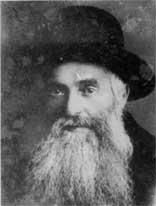Reflections
HaGaon Rav Eliyahu Dushnitzer zt’l
The multi-faceted character of this great Tzaddik personified untold greatness, sterling qualities and a G-dly spirit that resonated from deep within. His passing is mourned anew each year on the 22nd of Av, 5709
Rav Eliyahu was famous first and foremost for his exacting stringency in monetary matters. It is told that once he was approached by a neighbour in Petach Tikva who told him that he was travelling to Europe and would be in Lomze for a while – does the Gaon need anything from the town? Happily the Rav replied that yes, he had once bought a Sefer from a store in Lomza owned by a widow, and he felt he did not pay the full amount for it. Rav Eliyahu handed him the money and the Yid left on his travels, eventually arriving in Lomza. However once there, the widow incredulously told him that the Rav had tried sending her this sum of money a number of times already, and she repeatedly sent it back to him saying that when he bought the Sefer he had paid her the full amount, and owes her not a cent!
The home of Rav Eliyahu was a simple, humble shack whose floor was made of sand. Electricity was supplied by the Yeshiva and the Rav was extremely frugal in its use. He would study by the light of a lantern, saying that if he were to fall asleep it would be a waste on the electricity. During meals he also used a lantern, claiming that for eating it was more than sufficient.
Rav Eliyahu was particularly careful in his dealings with workers to whom he owed money. He once gave his coat to the local tailor to be fixed, and went to retrieve it on Erev Shabbos; he took the repaired garment, paid for it and left. Just before Shabbos however the Rav went to don his coat, and noticed that in addition to the repair that he had requested the tailor had fixed a small button on the coat. He immediately put aside the garment and did not wear it the entire Shabbos, until he had the chance to pay the tailor for the extra work.
Livelihood was not easy to come by in those days, and the revered wife of Rav Eliyahu Dushnitzer supported the family by selling chickens. She ran a stall in the marketplace, and one day the Rav noticed that there was a certain cat that persistently roamed around the chicken stall, eating up the scraps left behind. After his wife passed away Rav Eliyahu worried that he had halachically inherited the cat, in which case he was obligated in all laws of damages. He subsequently gathered three men together and pronounced the cat ‘hefker’, and sent it on its way…
Not only regarding his own Mitzvos and obligations did the Rav concern himself, but he felt a responsibility to the spirituality of those around him, too. He once noticed that a large eucalyptus tree standing in his neighbour’s yard would be stripped bare of its branches and leaves shortly before Succos by local children, who would help themselves to the foliage and sell it as S’chach to unknowing recipients. Rav Eliyahu went over to the owner of the tree and paid from his own pocket for the foliage – if only so that no Jew should unwittingly be sitting in a Succah under stolen S’chach.
The behaviour of Rav Eliyahu towards his students was legendary. The students tangibly felt his love and compassion, in particular when they were in need of rebuke. The Rav would approach the young man in question, and with soft words and warm smile lighting up his face he would lovingly advise him of the error of his ways. After which the Rav would not depart until he had begged forgiveness from the student in case he had hurt him! Rav Eliyahu explained his apology, citing the Chazal that inasmuch as it is a Mitzva to rebuke someone who will heed your words, it is a Mitzva not to rebuke the person who will not heed your words. “If so,” he would tell the student - “if you wish to count yourself as one who heeds rebuke then I have fulfilled the Mitzva of Tochacha. If not, then all I have done is hurt you and for that I plead forgiveness…”
The great Tzaddik Rav Eliyahu Dushnitzer zt’l, passed away in Petach Tikvah on the 22nd of Av, 5709.






